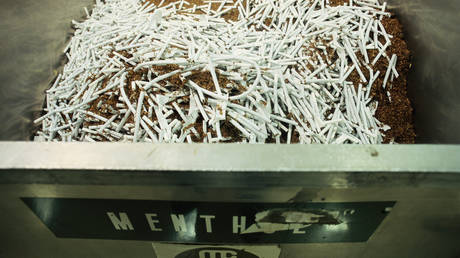Black Corruption: Funny Until It Isn’t

Fani Willis (photo courtesy of Wikipedia)
2,443 words
Corruption can be funny. This is especially the case when someone is bad at it, because then it ventures into the realm of comedy. Ultimately, however, it isn’t funny. It is the rust that corrodes civilizations. It rewards the lazy, the selfish, the cunning, and it punishes and demoralizes everyone else — especially if the perpetrators get away with it.
I once knew an Indian woman who said that she admired the fact that politics in the United States lacks corruption. I then pointed to a high-profile corruption case that was going on in local politics at the time to show that America does indeed have corruption. She responded by saying that at least in America corruption gets punished, whereas in India it typically does not.
That was nearly 20 years ago. Today we have Fulton County, Georgia District Attorney Fani Willis proving my friend wrong. In prosecuting former President Donald Trump for election interference, this woman is doing her best to help corrode America until corruption becomes so commonplace that no one bothers to punish it anymore — just like in India, which in 2023 had a below-average Corruption Perceptions Index score of 39 (out of 100) and achieved a less-than-stellar 93rd place in the world rankings (down one place from 2022).
Thanks to people such as Willis, corruption in America pays, plays, and for all we know, could cause Donald Trump to stand for President in November from a prison cell. In Willis’ case, the corruption is insultingly flagrant, cringe-inducingly sordid, and perpetrated entirely by black people. If you’ve read about the Reconstruction period following the American Civil War, you’ll know that we’ve seen this sort of thing before. Historically speaking, Willis’ antics are much closer to the norm than to the exception when it comes to black corruption — but at least in her case, it’s funny.
Willis began a criminal investigation in February 2021 into how Donald Trump and 18 others had purportedly attempted to overturn Joe Biden’s election victory in Georgia in 2020. Two-and-a-half years later, Trump and his allies were indicted on 41 charges for election interference — with Trump alone being indicted for 13 of them. But the fun began earlier this year when it became known that Willis had appointed her alleged lover, Nathan Wade, as the case’s Special Prosecutor despite the fact that Wade had little prosecutorial experience. Not only this, but the pair began to burn through the considerable wad of taxpayer dinero that Willis’ office was paying Wade for trips, hotels, vacations, and what were likely lavish sexcapades in places such as Napa Valley and the Caribbean. Willis found herself under scrutiny when co-defendant Michael Roman discovered this and filed a motion of disqualification due to a quite obvious conflict of interest.
When questioned back in January, Willis did not deny her relationship with the married Wade, but did deny any ethics violations, insisting that she had repaid Wade in cash — which is, conveniently for her, untraceable. Wade had put most of their expenses on his credit card, and there are no records that he ever got the money back. When put on the stand, Willis insisted that her Black Panther father taught her to always to keep piles of cash lying around the house — and then offhandedly admitted to spending her campaign funds on her own personal expenses.
Judge calls for a 5 minute recess as Fani Willis loses her cool shouting,
“It is a lie! It is a lie!”
Will he admonish her when court resumes? pic.twitter.com/yJASp2mlfH
— Sandy 〽️ (@RightGlockMom) February 15, 2024
And that dress she’s wearing? Yeah, she’s wearing it backwards.
According to Jonathan Turley, Willis also accused her accusers of being racist, because of course she did. Back in February, the Ace of Spades had a field day reporting on this slow-motion train wreck of a news story:
CashApp Cougar Fani Willis: Okay, Fine, So I Used Taxpayer Money to Hire a Human Meat-Mallet to Pound My Snizz Into Thin Tender Strips Like Veal Scallopini
So I wrote that headline on January 19th, and just waited for the inevitable news that Fani Willis admitted the affair.
I finally get to hit “publish” on this gem.
And if you think this lil’ blackety-black scandal couldn’t get any blacketyer, there’s more. Wade was involved in a messy divorce during this time, and his soon-to-be ex’s lawyers wanted to haul Willis in for a pretrial deposition, which would have unsealed the Wades’ divorce case — and likely embarrass Willis. Willis’ office then classlessly fired back at the former Mrs. Wade, accusing her not only of cheating on Willis’ illicit main squeeze when they were married but also conspiring “with interested parties in the criminal election interference case to use the civil discovery process to annoy, embarrass and oppress District Attorney Willis.” The “interested party” in this case appears to be Donald Trump himself.
Luckily for Willis, Wade settled with his ex-wife in time for her to avoid being deposed. Since no one is publicizing the settlement terms, Ed Morrissey speculates:
One has to imagine that Mrs. Wade finally got her piece of the massive fees that Willis paid Wade to run the RICO prosecution. Up to now, Mrs. Wade complained in earlier filings, she’d gotten bubkes while Willis lived high on the $650,000 in legal fees she paid Wade.

You can buy Spencer J. Quinn’s young adult novel The No College Club here.
It was also revealed that Willis had rewarded Wade’s business partners with lucrative contracts after they helped bankroll her campaign for District Attorney. Plus, Fani Willis risibly promised on the campaign trail not to have sex with employees or pocket taxpayer funds.
Maybe the biggest bump in this corruption carousel involves Amanda Timpson, one of Willis’ junior aides, who she fired after she warned Willis that another aide — one Michael Cuffee — was misappropriating federal grant money. (The audio recording of their conversation is available online.) It seems this young woman helped to write the grant application herself and really wanted the money to be spent as planned — that is, to help create a Center of Youth Empowerment and Gang Prevention; you know, for the kids. Instead, however, Cuffee preferred to divert the free federal goodies to more important causes, such as “MacBooks,” “swag,” and travel expenses for Willis’ staff. When Timpson confronted Cuffee over this, he dismissed her from projects and tried to intimidate her by claiming he had a special “relationship” with Miss Willis herself. Willis of course denied having any relationship with Cuffee, just as she had denied making any ethics violations to begin with.
More from Ace:
While this has no direct bearing on l’affaire Sweetdick, it does demonstrate that Fani Willis is as loose with rules about spending taxpayer money as she is in her droopy slackwalled choadbucket. Thus, one might suspect she might be a bit cavalier about spending taxpayer money to keep her Tax-Payer Funded Dick-Slinger in high style.
The headline on this one hilariously reads:
Fani Willis, Who Has Crabs More Frequently Than the Red Lobster Fisherman’s Feast Special, Fired an Employee Who Tried to Warn Her That Her Top Aide Was Misusing Funds.
This affair is ongoing, with the latest developments being that earlier this month, Fulton County Superior Judge Scott McAfee allowed Willis to proceed with her prosecution on the condition that Wade stepped down — which he promptly did. Trump and his co-defendants are currently appealing McAfee’s decision, hoping to get Willis disqualified and the entire case dismissed. Meanwhile, for what it’s worth, Georgia Representative Marjorie Taylor Greene has called for Fani Willis to be disbarred, while Ohio Congressman Jim Jordan is threatening to hold Willis in contempt over her office’s alleged misuse of federal funds. Willis, as is her wont, remains unrepentant.

You can buy Spencer Quinn’s novel White Like You here.
I have two views on this matter. First, Willis and Wade’s self-serving antics and mendacity are so over-the-top as to be doubly offensive: There’s the corruption itself, and then there is the abject stupidity of it all. Willis and Wade really thought they could get away with this sort of blatant misbehavior. When someone does corruption well, you don’t even know they’re doing it. Such people know that corruption is wrong and take great lengths to cover their tracks. This doesn’t necessarily make the corruption less corrupt, but it does make it harder to pull off. This alone serves as an impediment.
Fani Willis, however, thought it would be incredibly easy to pull off and that the public would either be too apathetic to notice or too jaded to care. After she was caught, she either lied or dissembled and insisted for nakedly partisan reasons to continue with her flimsy case against Donald Trump. How is this anything other than a complete mockery of justice? How is this also not a dire threat to civilization, given that the 2024 election could possibly be determined by a woman who thinks nothing of gratifying her expensive sexual appetites on the taxpayers’ dime? Someone like that should not be trusted to bag groceries, let alone head a District Attorney’s office in a major metropolitan area.
Second, we have seen this all before. American whites got their first taste of the jaw-dropping black penchant for corruption during Reconstruction. Some 150,000 whites were disenfranchised, and many blacks, along with profiteering Northern whites known as carpetbaggers, were given powerful positions throughout the defeated South. This launched a cavalcade of corruption, which left a bitter taste in white Southerners’ mouths for generations to come, and was one reason why there ended up being Jim Crow laws. This was the true price of Radical Republicanism, which kept the Southern states under its boot for 12 years.
In his classic 1947 book The South During Reconstruction: 1865-1877, E. Merton Coulter writes of the staggering Negro corruption on display in state conventions after the war:
Most of the Negro delegates could not read, some of them were fugitives from justice, some were dispelled for their truculence and disorderliness, and others were jailed for theft; but the great majority were harmless and took orders explicitly from their carpetbagger mentors. The loud-talking, troublesome few set off all Negro officeholders then and thereafter to a bad start, and gave them the reputation of being unscrupulous troublemakers or inane ninnies. Such were Joe Oats in Florida, Pinkney B.S. Pinchback in Louisiana, G.T. Ruby in Texas, and Tunis G. Campbell and Aaron Alpeoria Bradley in Georgia. Of Bradley, the best his radical friends could say was, “the arrogant presumption, ignorance, bullyism and impertinence of this negro, is becoming intolerable. Shortly he was expelled unanimously, and another Radical speeded his departure thus: “At last this worthless and brawling negro has been expelled from his seat in the Convention.”
These conventions were outrageously extravagant and many of their members were dishonest. A delegate living only 100 miles from Little Rock drew travel expenses for 900 miles; and a member of the North Carolina convention living 30 miles from Raleigh collected expenses for 262 miles. The Florida convention voted to begin salaries a month before the delegates convened. Taking over the functions of legislatures, these conventions wrestled with such problems as outlawing the terms “nigger” and “Yankee”; they changed the names of counties reminding them of Confederate heroes such as Lee and Davis; they spent many days debating measures designed to raise money for their salaries . . .
Thomas Nelson Page, in his 1904 book The Negro: The Southerner’s Problem, concurs:
The eight years of Reconstruction possibly cost the South more than the four years of war had cost her. To state it in mere figures, it may be said that when the eight years of Negro domination under carpet-bag leaders had passed, the public indebtedness of the Southern States had increased about fourfold, while the property values in all the States had shrunk, and in those States which were under the Negro rule had fallen to less than half what they had been when the South entered on that period. In Louisiana, for instance, the cost of Negro rule for four years and five months amounted to $106,020,337, besides the privileges and franchises given away to those having “pulls” and state franchises stolen. The wealth of New Orleans shrank during these eight years from $146,718,790 to $88,613,930, while real estate values in the country parishes shrank from $99,266,083 to $47,141,699.
This was not restricted to North America, of course. Former Rhodesian Prime Minister Ian Smith catalogued the political corruption that had been brought about via black rule in his country, which began when he ceded power to Bishop Murozewa in 1979. Soon, the vast majority of the people ruling Rhodesia — which was renamed Zimbabwe — were black. The corruption, as Smith writes in his autobiography The Great Betrayal, began immediately:
The sense of urgency was lacking. At our security council meeting the next day, 13 June, the point was again stressed that our black cabinet ministers were not active enough as far as our amnesty plan was concerned. Zindoga was the only one to hold a meeting in the tribal trust lands. The rest were sitting back, enjoying life in their new positions.
Toward the end of the book, describing the period after the Marxist tyrant Robert Mugabe took corruption to the next level by completely impoverishing his country and murdering tens of thousands of his own people, Smith writes:
Moreover, in keeping with the incompetence and corruption associated with communism, the economy has collapsed. Inflation and interest rates, which were below 3 per cent in the days of the previous ‘racist regime’, rose to a peak in excess of 40 per cent last year. The Rhodesian dollar was on a par with sterling, worth 100 pence, while today the Zimbabwe dollar is worth five pence. It is difficult to find a black Zimbabwean these days who will not tell you that is standard of living deteriorated since the advent of ‘freedom’ fifteen years ago. There are frequent reports of starving people roaming the countryside in search of wild fruits and seeds to eat in order to maintain life.
When the peasant farmer complains about the unavailability of land, he is told, indeed the whole world is told . . . that his government is having problems with white racist farmers reluctant to part with their land. The truth, of course, is the very opposite. I can take you to a farm which was productive and earning foreign exchange, taken over by government a few years ago, which is now lying unoccupied with derelict and ransacked buildings. There are many such cases, involving more than a million acres.
Black corruption reaches out in both time and space, and appears to be a universal aspect of the black character. It can be funny on a superficial level, especially when it’s practiced by self-serving cretins such as Fani Willis. But on a deeper level, the threat it poses to civilization is as profound as it gets.



